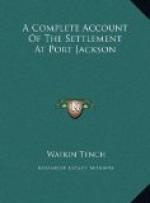The old man lived but a few hours. He bore the pangs of dissolution with patient composure; and though he was sensible to the last moment, expired almost without a groan. Nanbaree appeared quite unmoved at the event; and surveyed the corpse of his father without emotion, simply exclaiming, ‘boee’ (dead). This surprised us; as the tenderness and anxiety of the old man about the boy had been very moving. Although barely able to raise his head, while so much strength was left to him, he kept looking into his child’s cradle; he patted him gently on the bosom; and, with dying eyes, seemed to recommend him to our humanity and protection. Nanbaree was adopted by Mr. White, surgeon-general of the settlement, and became henceforth one of his family.
Arabanoo had no sooner heard of the death of his countryman, than he hastened to inter him. I was present at the ceremony, in company with the governor, captain Ball, and two or three other persons. It differed, by the accounts of those who were present at the funeral of the girl, in no respect from what had passed there in the morning, except that the grave was dug by a convict. But I was informed, that when intelligence of the death reached Arabanoo, he expressed himself with doubt whether he should bury, or burn the body; and seemed solicitous to ascertain which ceremony would be most gratifying to the governor.
Indeed, Arabanoo’s behaviour, during the whole of the transactions of this day, was so strongly marked by affection to his countryman, and by confidence in us, that the governor resolved to free him from all farther restraint, and at once to trust to his generosity, and the impression which our treatment of him might have made, for his future residence among us: the fetter was accordingly taken off his leg.
In the evening, captain Ball and I crossed the harbour, and buried the corpse of the woman before mentioned.




